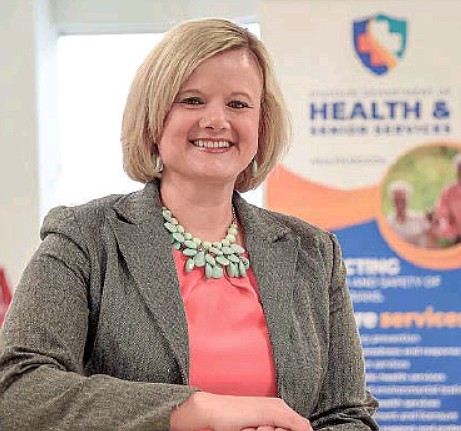Missouri's Comprehensive Cancer Program manager has put a recent focus on early detection and prevention of the second-leading cause of death in the state.
Misty Phillips organized Missouri's first cancer screening event for state employees Dec. 12. Nearly 250 public employees showed up, where they were offered take-home kits to test for colon cancer and the services of a mobile breast cancer testing unit. Some walked through an inflatable colon with snippets of colon cancer facts posted on it.
It was the first in Phillips's plan to increase awareness around cancer screening among state employees.
Phillips, a Mexico native, has worked for the Missouri Department of Health and Senior Services as its Comprehensive Cancer Program manager for a little more than a year. Before that, she worked for the department's Bureau of Epidemiology to ensure schools and daycares in the state don't have lead in their water.
She's the lead author of a peer-reviewed article published Dec. 1 in the Centers for Disease Control and Prevention's Preventing Chronic Disease publication. It's called "Implementing Educational and Systems-Level Changes to Improve Cancer Screening Rates Among State Employees in Missouri."
Cancer is the second leading cause of death in Missouri, according to the CDC. In 2020, approximately 12,907 Missourians died of cancer, which is a rate of 157.9 per 100,000 people.
Missouri has the 12th-worst rate of cancer in the nation, according to the federal agency.
State employees are screened for cancer at a lower rate than the general public, Phillips said.
As of 2022, only 51 percent of active eligible state employees in Missouri have been screened for colorectal cancer and 67 percent for breast cancer, despite having state-sponsored health insurance, according to the article she authored.
Phillips is the state's point person implementing solutions to combat cancer among state employees and the state more broadly.
The first phase, kicked off in 2020, was focused on providing education around cancer and screening recommendations. The second phase consisted of webinars to provide training on screening recommendations. The third phase is providing on-site cancer screening events, the first of which took place last week.
The state worked with a physician at Siteman Cancer Center to provide the colon cancer kits and Ellis Fischel Cancer Center to provide the breast-screening van at the state office complex on Wildwood Drive in Jefferson City. Educational sessions on colon and breast cancer were also part of the day's program.
"Employees have insurance, but they don't always know what the screening guidelines recommended ages are for cancer screenings," Phillips said. "And we want them to be able to use those resources that they have to be able to do the screenings to catch cancer early."
For the first two years, the efforts on state employees are focused on Central Missouri. It will expand out from there, she said, focusing on populations with higher rates and those in rural communities.
A "Strollin' Through the Colon" event in partnership with the American Cancer Society is planned for March.
In July, Phillips began work on a five-year grant to implement evidence-based interventions throughout the state to make improvements in cancer death prevention, specifically focusing on early detection and cancer treatments.
The efforts are laid out in a state action plan and include the recent efforts specifically focused on state employees.
To carry out the work, Phillips works frequently with the Missouri Cancer Consortium, built of doctors, researchers, nurses, cancer survivors and "basically anybody and everybody that's related to cancer" and working to "make improvements with the cancer burden across the state of Missouri," she said.
Phillips said her family tree has been marked with cancer diagnoses. She served as personal caretaker for an aunt diagnosed at young and traveled around the country with her for treatments. Her aunt died when she was 40 years old, the same age Phillips is now.
"She had always said that one person can truly make a difference," Phillips said. "That is true, if one person cares, they can make a difference. But I think the more you're able to use that to really try to collaborate with others and be open to learning, that you can accomplish a lot more."
"Being able to work together to solve some of those complex problems makes them a lot less scary," she added.

